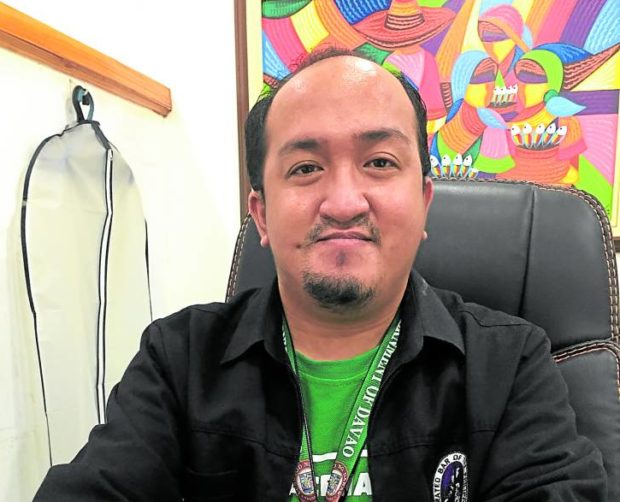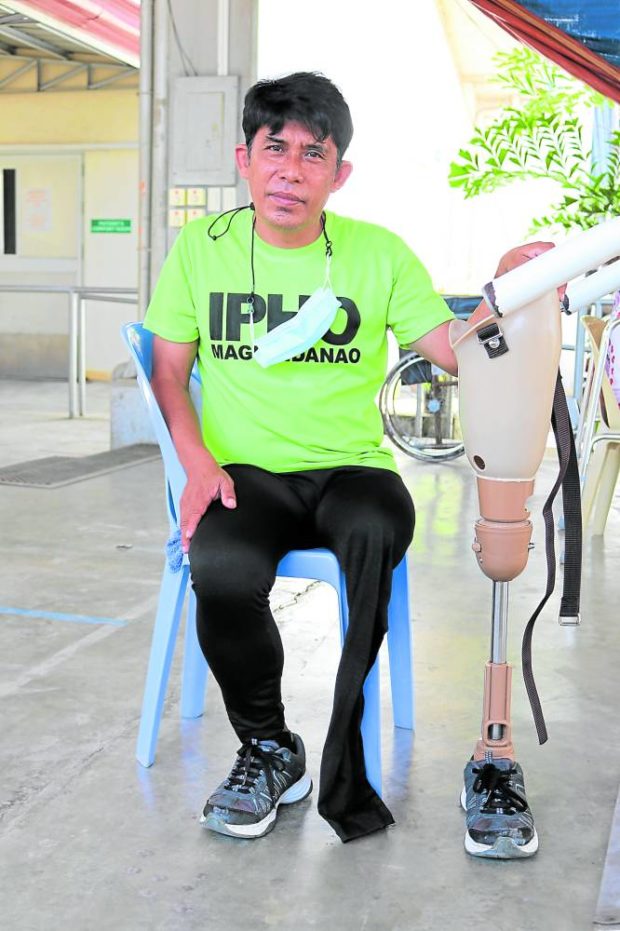Right to aid, not charity, for people with disability

CHANGING LIVES Lawyer Arsenio Caballero Jr. (left) of the Davao City legal office and Faisal (below), who works in Maguindanao Provincial Hospital, are among the persons with disability whose lives have changed through the help of Davao Jubilee Foundation. —PHOTOS BY GERMELINA LACORTE AND ICRC
DAVAO CITY—Arsenio Caballero Jr., a person with disability (PWD), cites this passage, attributed mainly to the late President Ramon Magsaysay, in achieving his dream of becoming a lawyer: “Those who have less in life should have more in law.”
Now with the trials section of the City Legal Office, Caballero, 33, thinks that PWDs should assert their rights for equal opportunity not only in the workplace but also in society.
For PWDs to be meek and mere subjects to charity, he said, is a thing of the past.
“PWDs nowadays should change their mindset,” he said. “They should start initiating projects to help themselves instead of just waiting for people to help them. This way, they will prove themselves to be capable members of society and not just persons to be pitied.”
As a lawyer working for the city government, he said he had been pushing for the setting up of the PWD Affairs Office provided in Republic Act No. 7277, or the Magna Carta for Persons with Disabilities, as a regular office under the government to take care of all concerns for those with disabilities.
Diagnosed with a congenital ailment as an infant that impaired his ability to walk, Caballero said he could have faced an uncertain future until the day personnel of Davao Jubilee Foundation (DJF) knocked on their door and enrolled him as their patient.
DJF, a nongovernment organization (NGO) based in this city, regularly conducts a disability assessment in different areas in Mindanao to seek those needing help, said Cheryl Arellano, DJF operations manager.
The group has been providing a variety of physical rehabilitation services to PWDs and people in need of supportive braces, wheelchairs or artificial limbs in the last 34 years.
Life-changing experience
Caballero said he was just 3 years old when DJF took him as a patient. “That visit [later] led me to have my first artificial leg, which changed my life drastically,” he said.
“Thanks to my artificial leg, I was able to live an almost normal life. I don’t think I would be where I am right now if it was not because of it. I could not imagine life without it,” he said.
But still, it was not an easy feat. “It was really a challenge. I had to accept the fact that I was different from my peers. This became more apparent when I was a teenager, since I was more conscious of my appearance and it somehow affected my confidence,” he said.
DJF’s advocacy work for PWDs also exposed him to different forums and seminars where he got to interact with other people, hence, boosting his confidence as a person.
But his difficulties did not prevent him from reaching his dream.
Pandemic impact
“As I grew up, I learned the deeper purpose of becoming a lawyer: That is, to give justice to those who are deprived of it; especially those who belong to the marginalized sector, the persons with disability, for example,” he said.
As the United Nations observed the International Day of Persons with Disabilities on Dec. 3, International Committee of the Red Cross (ICRC), the humanitarian partner of DJF, wanted to shine a light on PWDs like Caballero and their achievements.
Since 2007, ICRC has been among those providing DJF with both funding, and technical and management assistance so that the NGO, in turn, could provide the comprehensive physical rehabilitation services for all PWDs, regardless of the cause or reason of their impairment.
ICRC’s socioeconomic support for vulnerable DJF beneficiaries included a cash grant, which allows the beneficiaries to meet their family’s basic needs while accessing physical rehabilitation services.
“Nearly everyone in the world has been affected by the COVID-19 pandemic. But its impact varies greatly on the vulnerability of one’s own community,” said ICRC in a statement. “For persons with disabilities, the pandemic increased their health risks and further impaired their ability to receive rehabilitation services or to earn a living.”
DJF’s Arellano said that the rights of PWDs had already been acknowledged and provided in RA 7277. But budget remained to be the biggest challenge faced by NGOs like DJF.
Under the Magna Carta, it is the role of the government to provide medical intervention and assistive devices for PWDs, which means that these are supposed to be institutionalized and incorporated in the government’s regular budget each year.
But the way it’s been going on for years, assistance for PWDs still feels like charity, Arellano said.
The assistance has been coursed through different offices, among them, the offices of lawmakers, and has been subjected to disparity, depending on the judgment of those giving out the aid.

Faisal
Among the persons that DJF assisted this year is Faisal, 49, a staff at Maguindanao Provincial Hospital who was hit by a stray bullet in February while doing carpentry work for the hospital’s COVID-19 facility.
He said the stray bullet came from a clash between government soldiers and an armed group near the facility that day. As a result, he lost part of his left leg.